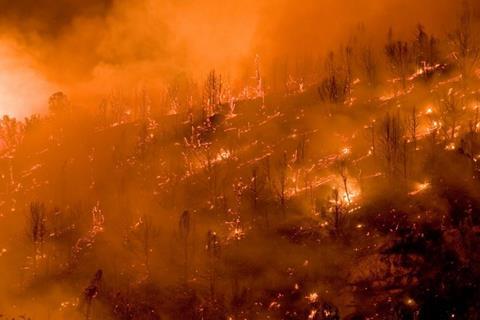[ad_1]
This article is the first in a series showcasing the role that businesses around the world are playing in the effort to avoid disasters. Future articles will include expert tips, case studies, and practical advice for building resilience.
Let’s set the scene.
What is a disaster? We are not talking about a crisis involving one or a few businesses (e.g. a cyber attack). We are talking about situations affecting societies, communities and the environment.

Different definitions exist. Our definition is brief and simple: a major situation requiring outside support for coping. Something happens, we cannot deal with it, and we need help.
Most disasters, whether involving storms, wildland fires, extreme heat, flooding, earthquakes, microbial pathogens, or something else, have major impacts on businesses.
One of us (Gareth) has written in the past in StrategicRISK about business interruption, and the need to ensure business resilience to a disaster threat. Businesses also have an important societal and environmental role to play towards avoiding disasters.
Can we avoid a disaster? Or are we destined to suffer the consequences, including human lives lost, livelihoods destroyed and harm to nature that may take a long time to recover from, if at all?
The answer is surely that disasters can be avoided.
“Most disasters, whether involving storms, wildland fires, extreme heat, flooding, earthquakes, microbial pathogens, or something else, have major impacts on businesses.”
No disaster should be a shock or “black swan” to us because, through practice and experience, we already know the hazards and threats facing our communities and businesses.
While not all hazards are fully predictable, we can assess and redress vulnerabilities and exposures when we choose to focus on them and act in a way that values people and the environment.
We can also track outcomes that show the economic benefits of those actions. Good things happen when committed people and organisations collaborate to prevent a disaster from happening.
It can be done. Through our NASA-funded Disasters Avoided case studies, we are documenting examples from around the world that show how disasters are being avoided.
The valuable role of private sector businesses is something we see time and again.
Key principles to avoiding a disaster
Success in avoiding a disaster happens when a wide variety of people and groups come together in a symphony of action, and they make good, informed decisions.
Common threads connecting these actions are:
- good governance and accountability
- the appropriate allocation of scarce resources and funding that is informed by science-based evidence and data.
Good governance and appropriate allocation of scarce resources stems from a political drive to provide the means for society to withstand and, often, work with nature’s energies and forces.
Disasters do not come from nature, they come from the choices we make to live and build in harm’s way, and to force people into harmful situations, or to do nothing about it if they put themselves in such situations.
So-called ‘natural disasters’ do not exist, they are just ‘disasters’.
However, as the Head of UNDRR (United Nations Office for Disaster Risk Reduction), Mami Mizutori, has stated: ”disasters can be prevented, but only if countries invest the time and resources to understand and reduce their risks.”
Businesses are playing their part…
As we saw with COVID-19, no region of the world is immune from catastrophe.
Upfront planning and action, and open knowledge sharing of what works well and what more needs to be done, helps us adapt and cope.
The key is a willingness, across the board, to invest in saving lives and livelihoods, and the environment. Doing so invariably reaps economic and financial rewards at the same time – which benefits everyone.
Businesses around the world were instrumental to helping us adapt and cope during the COVID-19 pandemic.
Pharmaceutical businesses, biotechs and researchers collaborated to develop vaccines at unprecedented speed, backed by government funding.
Key learnings
- Businesses are already playing a key role in helping to avoid disasters.
- Helping avoid a disaster helps the resilience of your business, including your supply chain.
- You need to think about the skills and services your business has that could help to avoid disasters. For instance, could your business work with government, researchers, and other teams towards this effort?
- Knowing where your vulnerabilities are, and the disaster threats you face, can help you focus your efforts in an appropriate way.
Many firms donated large amounts of personal protective equipment (PPE) to hospitals. Manufacturers, retailers and others quickly retooled their production lines to make ventilators and healthcare PPE.
Breweries adapted production processes to make hand sanitiser. Supermarkets and grocery retailers worked with their supply chains to keep the communities they serve fed. Restaurants switched to take-away meals, delivered by local delivery firms.
Many suppliers offered curbside pickup, so people could get their orders without going indoors or coming near staff.
As we move forward, various businesses are working with governments and others around the world to help us be better prepared for the next microbial pathogen.
This article is the first in a series designed to showcase role that businesses around the world are playing in the effort to avoid disasters. Future articles will include expert tips, case studies from around the world, and practical advice for building resilience.
- Gareth Byatt is an independent risk and resilience consultant (private sector).
- Ilan Kelman is a Professor of Disasters and Health at UCL, UK and the University of Agder, Norway (scientist).
- Ana Prados is a Senior Research Scientist at the University of Maryland, Baltimore County (scientist).
You can find out more at disastersavoided.com
[ad_2]
Source link
